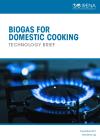

-
-
IRENA (2017), Biogas for domestic cooking: Technology brief, International Renewable Energy Agency, Abu Dhabi
Copied
/-/media/Files/IRENA/Agency/Publication/2017/Dec/IRENA_Biogas_for_domestic_cooking_2017.pdf
Copied
Biogas for Domestic Cooking: Technology brief
Newsletter
For households without access to grid-based electricity or gas for cooking, traditional cook stoves are typically fuelled by wood or charcoal, generating considerable indoor air pollution. Cook stoves fuelled with biogas provide complete combustion, significantly alleviating health and environmental problems.
This technology brief from the International Renewable Energy Agency (IRENA) provides technical background information, analyses market potential and barriers, and offers insights for policy makers on biogas for domestic cooking.
In many developing countries, biogas cooking can also improve the livelihoods of rural households, as by-products of biogas production such as slurry and fertiliser boost agricultural productivity. Modern biogas use, meanwhile, reduces the amount of time spent by women and children collecting wood.
Despite these clear advantages, the potential of domestic biogas has not been fully exploited. Constraints include: limited awareness about biogas applications; the initial cost of installation; lack of skilled labour for installation and operation; inadequate and intermittent government support; feedstock availability; the need for consistent maintenance; behavioural and social acceptance; and competition from fossil-based alternatives.
However, pre-fabricated biogas units constructed of fibre, plastic or lightweight bags can be cheaper to install, while investments in the biogas value chain, from installation to maintenance, can reduce costs further.
Successive technology briefs have highlighted a wide range of renewable energy solutions. Each brief outlines technical aspects, costs, market potential and barriers, combined with insights for policy makers on how to accelerate the transition to renewables.




